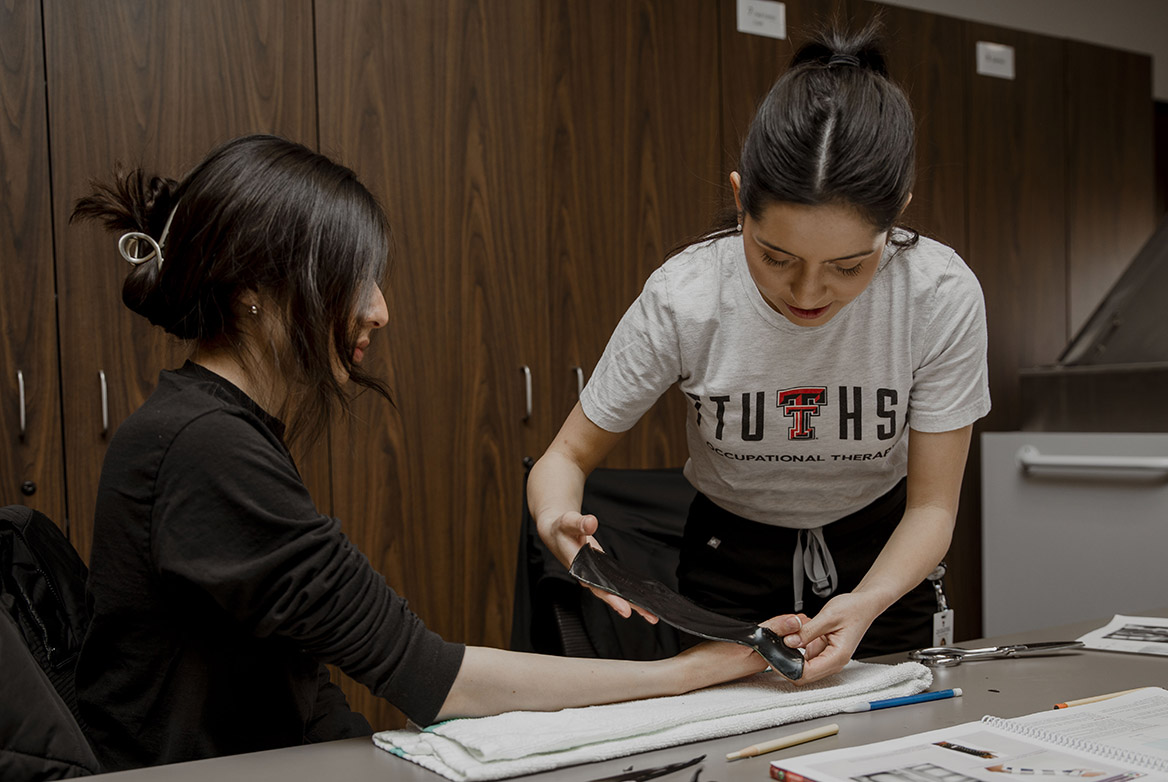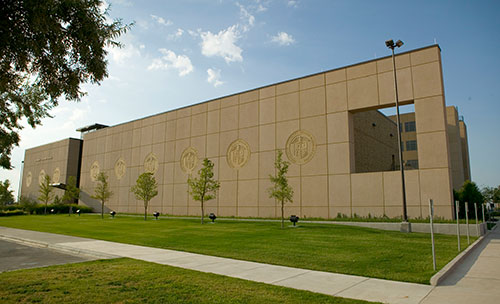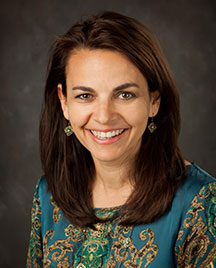Doctor of Occupational Therapy

What is Occupational Therapy?
The focus of occupational therapy is to positively influence the health and well-being of individuals so that they can participate in meaningful, purposeful activities in a profession or in their daily lives.
Occupational therapists work in partnership with individuals, families, and caregivers whose life patterns and ability to engage in valued daily activities have been disrupted as a result of various circumstances, including cognitive or developmental problems, injury or illness, social or emotional deficits, or the aging process.
About the Doctor of Occupational Therapy
The School of Health Professions Doctor of Occupational Therapy program is designed to provide you with the strong foundation in clinical reasoning, knowledge, and skills necessary to become a highly-qualified occupational therapist and improve the health of individuals and communities.
An Experienced Faculty, A Hands-on Learning Experience
Our faculty are highly-dedicated educators with years of research and clinical experience in a variety of settings. The faculty is committed to being accessible to all students and working with them as active participants in the essential knowledge, skills and clinical training that is key to successful occupational therapy practice.
The School of Health Professions is committed to providing a seamless, hands-on learning experience where you can continue your education and skills development outside the walls of the classroom. As a student in the program, you will practice assessing clients in the community, designing community enhancement projects, and collaborate with faculty, area clinicians, and local agencies to synthesize academic and clinical learning.
JULY 18![]()
Application Open
NOV. 15![]()
Application Deadline
SUMMER![]()
Program Start Term
You will also have the opportunity to be involved with the Student Occupational Therapy Association (SOTA) to further enhance your professional leadership skills and community service experiences.
The Doctor of Occupational Therapy program at the TTUHSC School of Health Professions is offered on the Lubbock campus. The entry-level occupational therapy doctoral (OTD) degree program is accredited by the Accreditation Council for Occupational Therapy Education (ACOTE) of the American Occupational Therapy Association (AOTA). Graduates will be eligible to sit for the national certification examination for the occupational therapist administered by the National Board for Certification in Occupational Therapy (NBCOT).
ACOTE
7501 Wisconsin Avenue
Suite 510E
Bethesda, MD 20814
Ph: 301-652-2682
ACOTE Website
Occupational Therapy Certification
As a graduate of the program, you will be able to sit for the national certification examination for the occupational therapist administered by the National Board for Certification in Occupational Therapy (NBCOT) After successful completion of this exam, you will be an Occupational Therapist, Registered (OTR). In addition, all states require licensure in order to practice; however, state licensure is usually based on the results of the NBCOT certification exam. (Please note: A felony conviction may affect a graduate's ability to sit for the certification examination or attain state licensure.)
Careers in Occupational Therapy
A career in occupational therapy is a challenging profession that calls on the therapist to use clinical reasoning and creative skills to meet the unique needs of clients.
Occupational therapists use their clinical reasoning and therapeutic skills to implement a process of occupation-based evaluation and intervention in a variety of settings, including at home, in school, in the workplace, or in the community, a hospital, or clinic. For example, as an occupational therapist, you could help a child with autism participate fully in school and social situations; you could work with a person who is recovering from a hand injury so they can return to work; you could assist a person with mental illness in learning to manage a daily medication routine or help an older adult who experiences physical and cognitive changes following a stroke to resume household tasks.
- The Bureau of Labor Statistics Occupational Outlook Handbook projects that jobs in occupational therapy will grow by 24% through 2026, much faster than average for all professions.
- For more information about the profession of occupational therapy visit the American Occupational Therapy Association (AOTA).
The Curriculum
The Doctor in Occupational Therapy curriculum prepares you to enter the field of occupational therapy as a competent, collaborative, and caring occupational therapist. The curriculum provides students with a strong foundation in the dynamics of occupation, critical reasoning, practice skills, and professionalism.
Lectures, case studies, concept mapping, laboratory experiences and clinical education
provide you with opportunities to integrate prior knowledge with new learning and
develop
your professional clinical reasoning skills. Classes include:
- Human Anatomy
- Professional Seminar Series
- Occupational Therapy Process
- Various Evaluation and Intervention Courses
- Doctoral Capstone Series
This program fosters professional behavior and relies on community experiences to incorporate the classroom material into clinical practice. Lab sizes are restricted to ensure optimal student/ instructor ratios and to enable you to receive comprehensive instructional and clinical experience.
Successful completion of the academic, fieldwork, and capstone requirements leads to a Doctor of Occupational Therapy degree.
Learn more about all program courses, clinical education, and fieldwork experiences.
Cost of Attendance
| Year 1 | Year 2 | Year 3 | Total | |
|---|---|---|---|---|
| Tuition | $9,806 | $10,086 | $8,125 | $28,018 |
| Fees | $5,658 | $4,500 | $4,302 | $14,461 |
| Total without Insurance | $15,464 | $14,587 | $12,428 | $42,479 |
| Student Health Insurance | $3,917 | $2,930 | $2,930 | $9,777 |
| Total with Insurance | $19,381 | $17,517 | $15,358 | $52,256 |
| Year 1 | Year 2 | Year 3 | Total | |
|---|---|---|---|---|
| Tuition | $23,981 | $24,666 | $19,870 | $68,518 |
| Fees | $5,658 | $4,500 | $4,302 | $14,461 |
| Total without Insurance | $29,639 | $29,167 | $24,173 | $82,979 |
| Student Health Insurance | $3,917 | $2,930 | $2,930 | $9,777 |
| Total with Insurance | $33,556 | $32,097 | $27,103 | $92,756 |
Note: Students are charged a Student Health Insurance fee each term. If the student has qualified health insurance, a waiver can be applied through Student Life. Prices are subject to change.
Graduation Rates
The total number of graduates from the TTUHSC Doctor of Occupational Therapy program during the 3-year period 2023-2025 (most current) was 145, with an overall graduation rate of 93%.
| Graduation Year | Students Entering | Students who withdrew or did not graduate with entering cohort for reasons other than academic performance | Students Graduating | Graduation Rate |
|---|---|---|---|---|
| 2025 | 53 | 0 | 49 | 92% |
| 2024 | 52 | 1 | 47 | 92% |
| 2023 | 53 | 2 | 49 | 96% |
| Totals | 158 | 3 | 145 | 93% |
Note: Graduation Rate is the number of students who graduated according to the published program length. If a student does not graduate according to the published program length, the student should not be counted as a graduate for ACOTE graduation rate reporting.
I'm very grateful for the amount and quality of resources and education provided by
the program to prepare me to pass the NBCOT exam on my 1st attempt!
Erin Nutter Class of 2025


